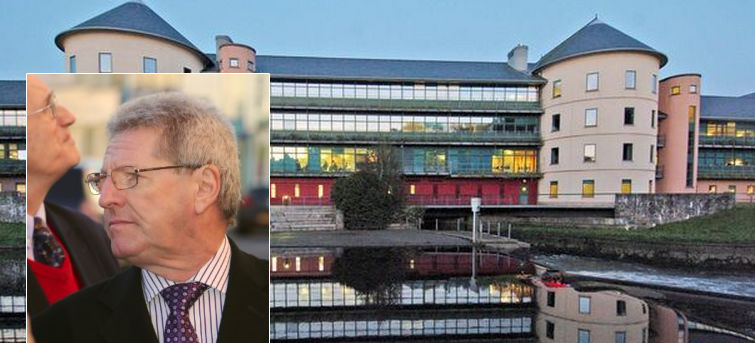AT ITS meeting on Monday this week, the Council’s Cabinet decided to recommend a Council Tax rise of 5% for the next financial year.
If the Full Council meeting agrees with its suggestion at its meeting on February 27, the rise will add £1.04per week to the average Band D household Council Tax bill.
Band D is the marker used by Councils across Wales to represent the average home.
Opening budget discussion, Cabinet Member for Finance Cllr Bob Kilmister, praised the level of scrutiny by Council committees and public engagement. The Facebook Live webcasts were particularly successful, the second reaching a record audience for such an exercise. Cllr Kilmister reported one engagement event at Llanteg produced high-quality questions, which demonstrated how the public had engaged with the process and the issues behind the Council’s budget. Cllr Kilmister also expressed satisfaction about engagement with the trades unions, whose written budget submissions are included in the consultation report for the first time.
Discussing the proposed Council Tax rise, Cllr Kilmister said where scrutiny committees expressed a preference, it was for a 5% rise. That figure also received the most support from the public who engaged in the consultation process. The unions wanted a 10% rise to preserve frontline services and avoid staff cuts.
He outlined amendments to aspects of the budgets had been made following committee scrutiny. However, he also reported a potential £1m item of additional expenditure due to the closure of Asian markets to recycling from overseas. The pressure, Cllr Kilmister reported, was UK-wide and resulted from a global reduction in recycling capacity.
Bob Kilmister said he accepted one particular request for amendment, which came from the Council’s Policy Overview Committee and related to funding climate change initiatives, but difficulties existed about the funding commitment without specific projects to which it could be allocated.
Accordingly, the Cabinet approved an amendment to the budget statement resolving to provide sufficient funding necessary to enable progress to be made and will make full use of any external funding opportunities. Sufficient resourcing will include the consideration of suitable Capital Bids and feasibility funding in line with the Capital Programme managed by the Capital Board and if necessary, revenue resource in the coming financial year, if it is necessary to support the work of becoming a Net Zero Carbon County by 2030.
Bob Kilmister underlined the Council’s commitment and his commitment but said a considered approach was needed. He was adamant he would not agree to the diversion of resources from core services, such as education and adult social care. He said projects needed a clear business plan and had to show how benefits would accrue from capital investment and revenue use. Cllr Kilmister said he suspected extra money would come forward once the UK Government set the budget in March, possibly – although not certainly – through grants from the Welsh Government. He cautioned against depending on those grants.
The cost of adult social care and the budget for it was the subject of an impassioned intervention from Cllr Tessa Hodgson. Cllr Kilmister responded that ‘we are at a crisis point in adult social care’. Proposals for funding had to come from central government and come quickly. The current funding model for social care, he said, was not working; central government knew it didn’t work; had known it didn’t work for some time; had done nothing about it.
Making a political point at the end of the discussion, Cllr Paul Miller noted last year, when Pembrokeshire had a poor budget settlement, Conservatives had rushed to condemn the Welsh Government. He cynically observed this year, when Pembrokeshire had one of the best budget settlements, there hadn’t been a positive response to the announcement.
Council Leader David Simpson wound up the debate with some strong words about those of the Council’s Overview and Scrutiny Committees which refused to give the Cabinet a steer on its budget for the coming year. He reflected upon the lack of consultation before budgets under the previous administration where councillors were given information the day before cuts were due to place.
David Simpson said he was frustrated that Council committees and their members, presented with information, sat on their hands when offered the chance to input into the process of budget-setting positively. He made it clear that a steer given at the consultation stage was not a commitment to support the budget in the chamber but a response to the information given to the committee during its questioning of Cabinet members and officers about the coming year’s budget.
The Council Leader took time to single out Cllr Brian Hall for congratulations on seizing the chance as Chair of the Corporate Overview of Scrutiny Committee to give Cabinet a steer by asking members of his Committee to vote on a recommendation to give to Cabinet based on the information they had before them on the day they met. That was the sort of response the Cabinet wanted to help it set priorities for the budget.
Cllr Simpson said democracy was in a chamber of sixty people and not just to be doled out by Cabinet. The budget, he said, ‘is not a Cabinet decision’ and found councillors’ reluctance to participate when invited to do so ‘strange’.
‘That’s life!’ Cllr Simpson observed bitterly to close the discussion.















